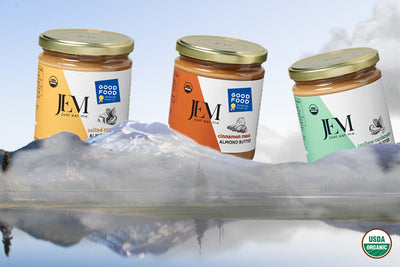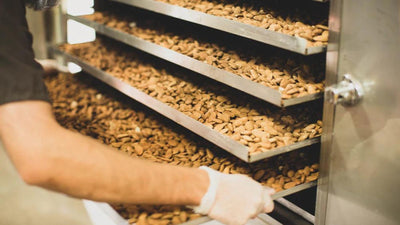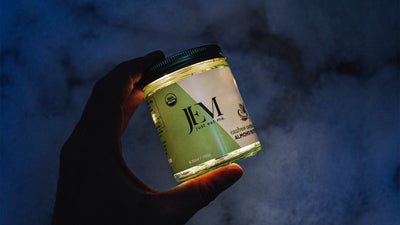by Jen Moore, Co-Founder & CEO of Jem Nut Butters, BS in Nutrition and Exercise Physiologist
Most people enjoy nuts like almonds, cashews, hazelnuts, and peanuts (if there are no allergies present) as well as the creamy, rich buttery bi-product we have all enjoyed on sandwiches, with apples and bananas for what seems like generations. Although most people are not aware that proper preparation is key when it comes to actually getting the nutrients they carry, to avoid any indigestion that may occur from mass-produced nuts and seeds that make their way onto the shelves of our food grocers.

First of all, I prefer to use the terms soaked and germinated. Soaking is only half the battle (as germination can imply anything expanding into greater being from a small existence) in sprouting, soaking and germinating nuts and seeds. Grains and legumes have been going on for a very long time. Documentation has been noted as far back as 3000 B.C. in China, and in the old testament of the Christian Bible. More recently, in the past 10 plus years sprouting and soaking nuts, seeds and grains have increased in popularity with the resurgence of the extensive work done by Dr. Weston Price.
In her book, Nourishing Traditions, Sally Fallon has many great recipes using sprouted foods. I believe that one of the contributing factors to the increased popularity and knowledge around sprouting is due to a larger number of people who have become more food sensitive and need the help that sprouting, soaking and germination provides that makes their foods more bio-available and easier to digest. As a Nutritionist and Exercise Physiologist, I feel motivated to help educate people on the simple but highly important ways to prepare nuts and seeds so they can enjoy them, but also obtain the benefits from them.
Why take the time soak, germinate then dehydrate nuts? Four good reasons it is worth the time.
One: If nothing else, you are cleaning them! All nuts go through a lot before they get to you. Why not take some time and give them a good soak and rinse? They have been on a long journey.
Two: They just taste better!
Three: Increased nutritional availability according to Dr. Szekely and written in Gabriel Cousens MD book, Spiritual Nutrition. Soaked sprouted and germinated nuts, seeds, and grains have an increased energy charge. They are high in digestible proteins, essential fats, enzymes, minerals, and vitamins. Soaking activates enzymes and neutralizes acids in order to increase the nutrition available in the nut.
Four: Helps to alkalize the body.
Why is this important? Bacteria and disease do not seem to flourish in alkaline environment. When nuts are soaked and germinated their pH increases which makes them more alkaline and in turn can be a part of an alkaline rich diet that takes your body from more of an acidic state (think inflammation), to an alkaline state.
How to soak and germinate Almonds:
- Soak almonds for 12 hours in enough filtered or spring water to cover nuts with about an inch extra in the top. Add approx. 1 tsp pink Himalayan salt for every 1 cup organic almonds. You can soak in the fridge.
- Rinse almonds well.
- At this point you can do many things with your “activated” almonds:
b. Make your own nut milk blend with a little water then using a nut bag, squeeze out the milk. Add some vanilla and yum –– drink up!
Enjoy the process of slowing down and taking the time to soak, sprout and germinate. It’s worth the time and your body will be better off. Jem Butters are all sprouted; can you taste the difference? Shop Jem online to see.
In good health,
Jen Moore






